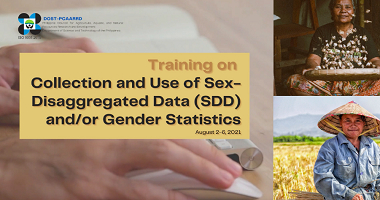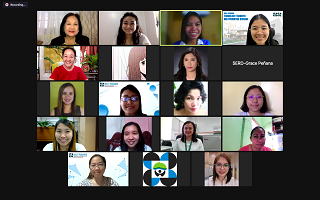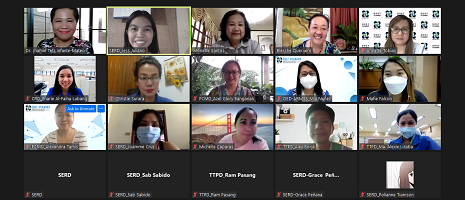 The Philippine Council for Agriculture, Aquatic and Natural Resources Research and Development of the Department of Science and Technology (DOST-PCAARRD) conducted a week-long gender and development (GAD) training on the Collection and Use of Sex-Disaggregated Data (SDD) and Gender Statistics for its technical staff on August 2 to 6, 2021.
The Philippine Council for Agriculture, Aquatic and Natural Resources Research and Development of the Department of Science and Technology (DOST-PCAARRD) conducted a week-long gender and development (GAD) training on the Collection and Use of Sex-Disaggregated Data (SDD) and Gender Statistics for its technical staff on August 2 to 6, 2021.
It is the second phase of the series of GAD training planned for 2021. The first phase was on Basic Gender Analysis (GA) and Use of GA Tools for R&D Management and Implementation training held on June 16 to 18, 2021.
In his opening message, Dr. Ernesto Brown, Director of the Socio-Economics Research Division (SERD) of DOST-PCAARRD, discussed the importance of integrating gender dimension in the research process, but the lack of gender-disaggregated data often results in an incomplete picture of women and men’s lives especially on the existing gap between them.
 He concluded with a reminder that “the collection of sex-disaggregated data is not only limited to the comparison of female- and male-headed households but also understanding the role of both women and men, and how it may change in the context of new policies, markets, and technologies.”
He concluded with a reminder that “the collection of sex-disaggregated data is not only limited to the comparison of female- and male-headed households but also understanding the role of both women and men, and how it may change in the context of new policies, markets, and technologies.”
The resource persons for the Collection and Use of SDD Training were GAD experts Ms. Monette Santos, Dr. Blesshe Querijero, and Dr. Jhamie Tetz Infante-Mateo. Santos is a member of the Philippine Commission on Women (PCW) National GAD Resource Pool; Querijero is also a member of the PCW National GAD Resource Pool Batch 1 and former DOST-wide GAD Mainstreaming Coordinator from 2007 to 2013; Infante-Mateo is the University Director for Gender and Development at Isabela State University. A total of 20 participants from the different divisions of DOST-PCAARRD attended.
On Day 1, Santos discussedthe basic GAD concepts and principles and gender issues, and understanding the concept of sex-disaggregated data and gender statistics. Day 2 focused on the gender indicators and use of gender analysis tools using Harvard Analytical Tool and other related tools that are applicable to the collection of SDD and/or gender statistics, which were all extensively discussed by Querijero.
 On Days 3 and 4 of the training program, Infante-Mateo focused on the identification of gender indicators and dimensions, and establishment of GAD databases in the divisions. On the last training day, the participants presented their workshop outputs, one of which was a revised Policy Framework of PCAARRD where GAD is integrated.
On Days 3 and 4 of the training program, Infante-Mateo focused on the identification of gender indicators and dimensions, and establishment of GAD databases in the divisions. On the last training day, the participants presented their workshop outputs, one of which was a revised Policy Framework of PCAARRD where GAD is integrated.
During her closing message, Annette Tobias, Unit Head of the Gender and Development and Special Projects Unit of SERD, recognized the efforts of the resource persons and participants in the weeklong activity. She also expressed her excitement in witnessing the growing number of gender advocates in the Council.
The training is part of the capacity building activities of the DOST-PCAARRD funded and implemented project, “Enhancement of Gender and Development (GAD) Integration Towards a More Inclusive R&D in AANR.” The project is implemented by the SERD-GADSPU.
In partnership with the Socio-Economic Research and Data Analytics Centers, the same trainings were implemented by SERD-GADPSU,on August 9-13, August 16-20, and August 23-27, 2021 the Luzon, Visayas, and Mindanao network researchers of the Council, respectively
